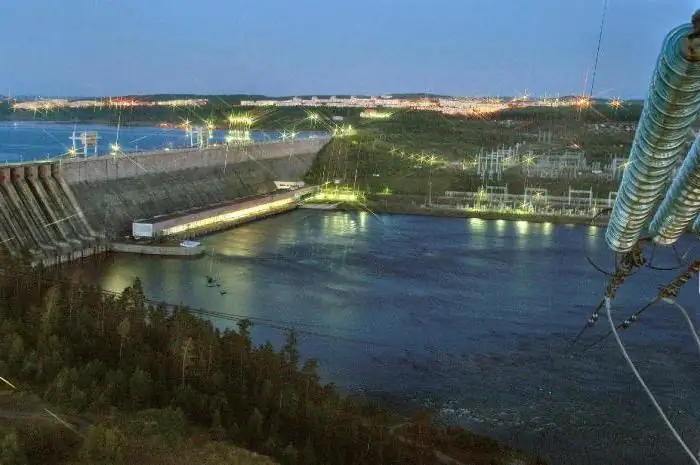2026 Author: Howard Calhoun | calhoun@techconfronts.com. Last modified: 2025-01-24 13:10:41
Zhigulevskaya HPP was the dream of the Soviet government at the very dawn of the country's formation. The implementation of plans began in the 1930s, and large-scale construction was completed in record time after the Great Patriotic War. The history of the Zhigulevskaya HPP is one of the pages of the industrialization of the USSR and the energy security of Russia.
From idea to launch
The idea of building the Zhigulevskaya hydroelectric power station in 1910 was submitted to the tsarist government by Samara engineer G. M. Krzhizhanovsky. It turned out to be realized only after the revolution, when the GOELRO plan was approved, initiated by the same engineer, but already in the status of chairman of the electrification commission.
In the early 1930s, in the area located near the village of Krasnye Luki, exploration work began to develop the energy potential of the Volga. The result was a proposal for the construction of the Kuibyshev hydroelectric power station, where it was possible to equip three points for the start of work. The first construction site appeared near the village of Krasnye Luki. To support the large-scale project of the Zhigulevskaya HPP, a headquarters was built. But already in 1940 in placeof the proposed location of the station, oil deposits were discovered, and the construction was frozen.

After the war
In the post-war period, additional exploration work was carried out by the forces of the Hydroproject Institute. A suitable site was found near the city of Zhigulevsk. According to the project approved in 1949, the capacity of the Zhigulevskaya HPP was planned at the level of 2.1 million kWh.
Construction began in 1950 and immediately took on a large scale. About 50 construction and assembly enterprises belonging to almost all ministries of the country were involved in the implementation of the plans. About 130 institutes and design bureaus took part in the design of units and premises, more than 1300 factories were engaged in the supply of equipment and components. I. V. Komzin was appointed head of the construction of the facility, who received the title of Hero of Socialist Labor for the development and implementation of a large-scale project.

Construction stages
The Zhigulevskaya HPP is a major post-war facility that required a weakened economy to mobilize a large amount of labor and resources. The issue of human resources was resolved rather harshly - the bulk of the builders were prisoners, for their maintenance they established the Kuneevsky ITL, which was subordinate to the Glavgidrostroy of the USSR Ministry of Internal Affairs.
Dumping of stone from the right bank of the Volga for the construction of a dam began in the winter of 1950. The official start date for construction is February 18, 1951, when the first soil was excavated from the zonefuture pit. The Zhigulevskaya HPP was a demonstration construction site. To implement and accelerate the pace of work, all the advanced equipment at that time was pulled to the site.
In July 1951, on the left bank of the river, the construction of lower locks and a powerful concrete plant began. In the spring of 1952, the construction of an eight-kilometer-long weir began, and in the summer it was time to build the upper locks of the hydroelectric complex for shipping. In December of the same year, the hospital complex was put into operation.

High pace
The Zhigulevskaya hydroelectric power station was built at an accelerated pace, sometimes up to 20 thousand cubic meters of concrete were laid in a day of work, which was a record even by world standards. In December 1952, work began on concreting the bottom of the lower locks, two months later the cultural life of the builders was filled - a new club of oil workers was put into operation in the village of Solnechnaya Polyana.
In April 1953, a stone-crushed stone plant began its work, the products of which began to be used in the construction of a hydroelectric station from July 30. The foundation of the entire slab of the Zhigulevskaya HPP was completed in July 1954. In the history of construction, the most important moment has come - the creation of a dam. The start was given on August 15, 1955; In October, the waters of the river were brought into the pit.
The blocking of the river from the right bank was completed in record time, it took specialists a little more than 19 hours for the most difficult operation. Over the next two weekswork was underway to eliminate minor flaws in the body of the dam. In November 1955, water began to fill the Kuibyshev reservoir.
The design water level in it was reached only in June 1957. At the time of reaching the operational capacity, the Kuibyshev reservoir was the largest in the world - the area occupied about 6 thousand square kilometers, the length was 510 meters, the width in some places reached 27 kilometers.

Records
The history of the Zhigulevskaya HPP in July 1955 was marked by the passage of the first ship through the lower ship locks. In November, the main channel of the Volga was blocked, in December the installation of the first hydroelectric unit was completed and its commercial operation began. During 1956-1957, the remaining eleven hydroelectric units were launched. The first billion kilowatt-hours was received in October 1956. The date of completion of the main stage of construction is October 14, 1957, when all the turbines of the HPP were already producing industrial current.
The installation of each turbine with a capacity of 150 thousand MW took about a month, after putting them into operation, it turned out that the power developed by the turbines reaches 115 MW. As a result, the units were re-labeled, and the installed capacity of the HPP increased to 2.3 GW.
All further efforts were directed to the construction of administrative, utility buildings of the station's infrastructure and social facilities in Zhigulevsk and Stavropol. Zhigulevskaya HPP is a unique structure, the entire hydroelectric complex was built within seven years. During this period it wasalmost 200 million cubic meters of earthworks have been done, about 8 million cubic meters of concrete have been laid, 200 thousand tons of metal structures and equipment have been installed.

Operation
Zhigulevskaya HPP was officially opened on August 9, 1958 in a solemn atmosphere and in the presence of top officials of the USSR. The next day, the station was renamed the Volzhskaya HPP, named after V. I. Lenin. Many participants in the construction received government awards. The prisoners who worked on the construction were released under an amnesty, some of the remaining prisoners had their sentences reduced.
By the beginning of August 1966, the Zhigulevskaya HPP had generated its jubilee 100 billion kilowatt-hours of electricity. In the same period, systematic automation of all control processes at the station took place, until the end of the 70s, a large-scale modernization of equipment was carried out.
With the change in the economic system in 1993, the status of the station also changed: as a result of the reorganization, the company became an open joint-stock company. In 2001, the Zhigulevskaya HPP became part of the Volga Hydropower Cascade. Since 2003, the hydroelectric power station has been a supplier of electricity to the wholesale market, where it sells up to 15% of all generated energy, the rest of the resources are supplied to the regulated federal market.

Modernity
Today, the owner of the station is the RusHydro holding. Zhigulevskaya HPP is a run-of-river hydroelectric power plant,all buildings of which belong to the first class of capital. Infrastructure includes:
- Earth dam 52 meters high (750 m wide, 2800 m long).
- The power plant building is 700 meters long.
- A spillway dam 980 meters long.
- Shipping locks.
The height of the Zhigulevskaya HPP in the dam part is 40.15 meters, the HPP building has a height of 81.1 meters. On the upper part of the dam, a railway and motorway track was laid between Moscow and Samara. The station's capacity is 2,320 MW, and the average annual electricity generation is 10.5 billion kWh. The machine room is equipped with 20 Kaplan turbine units, 14 of which are 115 MWh and 4 are 120 MWh.

Modernization
In 2010, RusHydro entered into a contract with Power Machines OJSC for the modernization of hydroelectric units. By June 2017, 19 vehicles received the update, the completion of the entire set of measures is scheduled for November 2017. The measures taken to update the funds will increase the station's capacity to 2488 MW.
As at the beginning of construction, today the capacity of the Zhigulevskaya HPP structures is amazing. Photos of the station, the dam and the entire hydroelectric complex inspire respect for the genius of designers and builders.
Recommended:
How to clean your credit history in Russia? Where and for how long is the credit history kept?

It is not easy to get a loan for customers with delinquency. To increase your chances of getting a loan, you need to look for options to improve your credit history. You can clear your credit history within 1-3 months. This can be done in several ways
Spoiled credit history - what is it? Where to get a loan with bad credit history

Failure to fulfill your obligations leads to a damaged credit history, which further minimizes the likelihood of approval of the next loan. In addition, the bank has the right to charge fines and pen alties, they will have to be paid along with the amount taken and interest
HPP Cheboksarskaya: photo, history, environmental impact

The history of the Cheboksary HPP is closely intertwined with the history of the city where it was built. It would be logical to assume that we are talking about Cheboksary (after all, the HPP is Cheboksary). However, this is not so: Novocheboksarsk is considered to be the city of power engineers. In addition, this hydroelectric power plant is part of a huge project network, conceived in the last century. All this and more will be discussed below
Irkutsk HPP: construction, history, photo

The Irkutsk HPP is the very first and largest hydroelectric power plant built on the Angara. It laid the foundation for the formation of a whole energy complex. Difficulties in its construction helped to gain a truly invaluable experience
HPP Ust-Ilimskaya: photo, address. Construction of the Ust-Ilimskaya HPP

In the Irkutsk region, on the Angara River, there is one of the few hydroelectric power plants in the country that has paid for itself even before construction was completed. This is the Ust-Ilimskaya HPP, the third stage in the cascade of stations on the Angara

